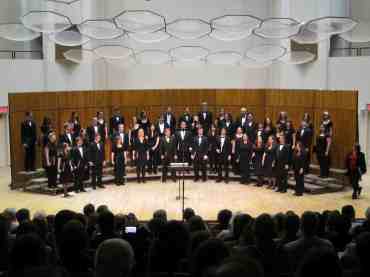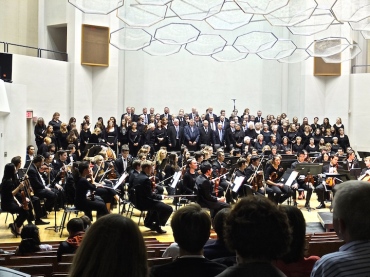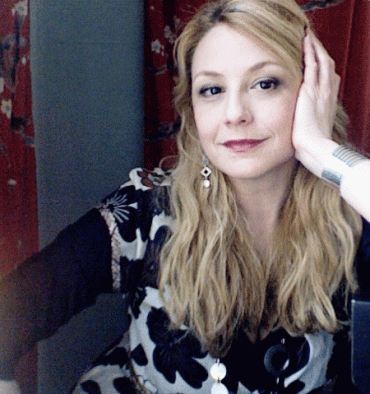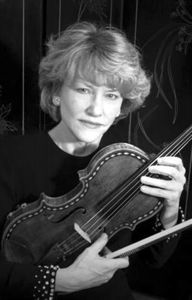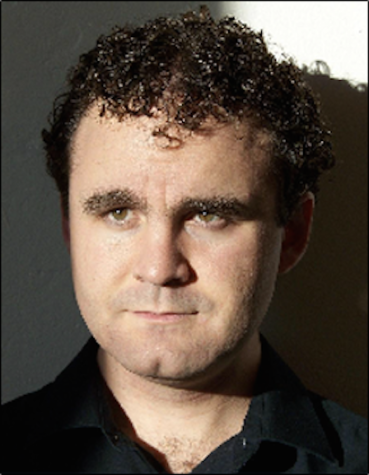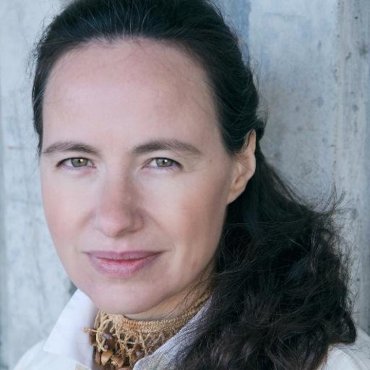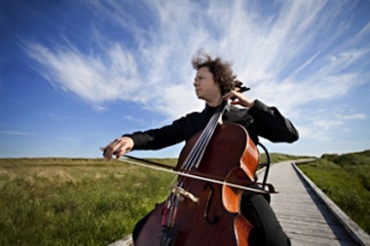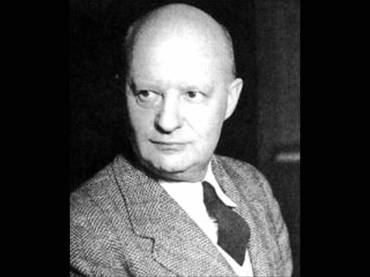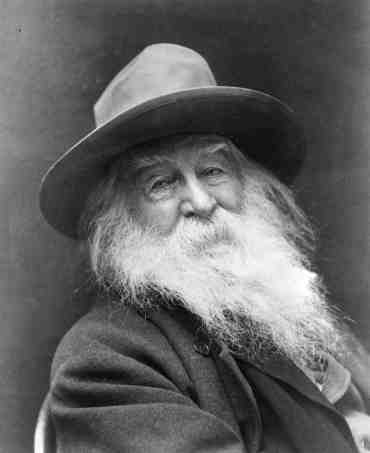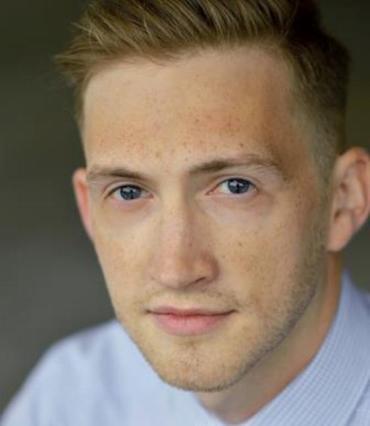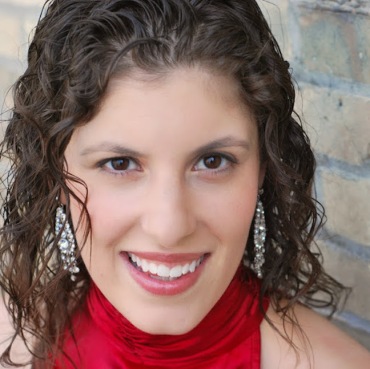The Well-Tempered Ear
Classical music: This weekend, the Madison Symphony Orchestra celebrates Valentine’s Day with violinist Pinchas Zukerman and cellist Amanda Forsyth in the Romantic “Double Concerto” by Brahms
Leave a Comment
PLEASE HELP THE EAR. IF YOU LIKE A CERTAIN BLOG POST, SPREAD THE WORD. FORWARD A LINK TO IT OR, SHARE IT or TAG IT (not just “Like” it) ON FACEBOOK. Performers can use the extra exposure to draw potential audience members to an event. And you might even attract new readers and subscribers to the blog.
By Jacob Stockinger
This coming weekend, the Madison Symphony Orchestra, under the baton of John DeMain, will celebrate Valentine’s Day.
The program “Romantic Encounter” examines the brashness of French composer Hector Berlioz’s “Le Corsaire” Overture, as well as the thundering seriousness of American composer Aaron Copland’s Symphony No. 3.
The husband-and-wife duo (below) of violinist Pinchas Zukerman, and cellist Amanda Forsyth make their return to Madison to reprise their performance of German composer Johannes Brahms’ Double Concerto for Violin and Cello in A minor. (You can hear the passionate slow movement in the YouTube video at the bottom.)
Performances will be held in Overture Hall, 201 State Street, on Friday, Feb. 14, at 7:30 p.m.; Saturday, Feb. 15, at 8 p.m.; and Sunday, Feb. 16, at 2:30 p.m.
Tickets are $19 to $95. See below for details.
Says maestro DeMain (below, in a photo by Greg Anderson) about the world-renowned duo: “The married team of Pinchas Zukerman and Amanda Forsyth return to recreate their exciting interpretation of the Brahms Double Concerto for violin, cello and orchestra.
“One of Berlioz’s finest overtures, the exhilarating Le Corsaire opens the concert. And Aaron Copland’s majestic, powerful and lyrical Third Symphony — which is one of Copland’s great masterpieces and includes his Fanfare for the Common Man — is heard on the second half of the program.”
Eight minutes long, Berlioz’s swashbuckling “Le Corsaire” was composed in Nice, France, after the final break-up of his marriage. The composer resided in a tower above the sea, which explains the ruined fortification’s depiction in his overture. “Corsaire” translates to “a ship used for piracy,” but this meaning is not related to the work.
The Double Concerto was Brahms’ final work for orchestra. He composed the concerto for his old but estranged friend, violinist Joseph Joachim, as well as for cellist Robert Hausmann. With few recent precedents, the closest comparison to this work would be the Baroque concerto grosso, in which a soloist or small group is contrasted with an entire ensemble.
Copland’s monumental Symphony No. 3 was commissioned by conductor Serge Koussevitsky and the Boston Symphony Orchestra. The work perfectly reflects the spirit of post-war America and impressively holds the title of “Greatest American Symphony.” In writing this piece, Copland (below) borrowed from himself by incorporating his triumphant Fanfare for the Common Man.
ABOUT PINCHAS ZUKERMAN
With a celebrated career encompassing five decades, Pinchas Zukerman reigns as one of today’s most sought-after and versatile musicians — violin and viola soloist, conductor and chamber musician. He is renowned as a virtuoso, admired for the expressive lyricism of his playing, singular beauty of tone, and impeccable musicianship, which can be heard throughout his discography of over 100 albums.
Born in Tel Aviv, Zukerman came to the United States where he studied at the Juilliard School with Ivan Galamian as a recipient of the American-Israel Cultural Foundation scholarship. He received the National Medal of Arts from President Ronald Reagan and is a recipient of the Isaac Stern Award for Artistic Excellence in Classical Music.
ABOUT AMANDA FORSYTH
The Canadian and Juno Award-winning Amanda Forsyth is considered one of North America’s most dynamic cellists. She has achieved her international reputation as soloist, chamber musician and was principal cello of Canada’s National Arts Centre Orchestra from 1999 to 2015. Her intense richness of tone, remarkable technique and exceptional musicality combine to enthrall audiences and critics alike.
PROGRAM NOTES, TICKETS AND EVENT DETAILS
The lobby opens 90 minutes prior to each concert. The MSO recommends that concert attendees arrive early for each performance to make sure they have time to pass through Overture Center’s security stations, and so they can experience the Prelude Discussion that takes place one hour before each concert.
Program notes are available at: http://www.allsenmusic.com/NOTES/1920/5.Feb20.html
- Single Tickets are $19-$95 each and are on sale now at: https://madisonsymphony.org/event/romantic-encounter/through the Overture Center Box Office at 201 State Street, or by calling the Box Office at (608) 258-4141. Fees apply to online and phone sales.
- Groups of 10 or more can save 25% by calling the MSO office at (608) 257-3734. For more information, visit, https://madisonsymphony.org/concerts-events/buy-tickets/group-discounts/.
- Student rush tickets can be purchased in person on the day of the concert at the Overture Center Box Office at 201 State Street. Students must show a valid student ID and can receive up to two $15 or $20 tickets. More information is at: https://madisonsymphony.org/concerts-events/buy-tickets/student-rush/
- Seniors age 62 and up receive 20% savings on advance and day-of-concert ticket purchases in select areas of the hall.
Discounted seats are subject to availability, and discounts may not be combined.
Major funding for the February concert has been provided by NBC 15; The Madison Concourse Hotel and Governor’s Club; Marvin J. Levy; Fred and Mary Mohs; Nancy Mohs; and David and Kato Perlman.
Additional funding has been provided by Robert Benjamin and John Fields; Boardman and Clark LLP; Forte; Barbara Melchert and Gale Meyer; and the Wisconsin Arts Board with funds from the State of Wisconsin and the National Endowment for the Arts.
Tags: #AaronCopland, #AmandaForsyth, #AmericanComposer, #BaroqueMusic, #BlogPost, #BlogPosting, #BoardmanandClark, #BostonSymphony, #BoxOffice, #CanadianMusician, #CelloConcerto, #ChamberMusic, #CityofMadison, #ClassicalMusician, #CommissionedMusic, #ConcertoGrosso, #DoubleConcerto, #FacebokPosting, #FacebookPost, #FanfarefortheComonMan, #FredMohs, #GermanComposer, #Governor'sClub, #HectorBerlioz, #husband-and-wife, #InternationalReputation, #IsaacStern, #IsraeliMusician, #IvanGalamian, #JacobStockinger, #JohannesBrahms, #JohnDeMain, #JosephJoachim, #JuilliardSchool, #JunoAward, #JunoAwards, #JunoAwrd, #KatoPerlman, #LawFirm, #LeCorsaire, #LyricalMusic, #MadisonConcourseHotel, #MadisonSymphonyOrchestra, #MeadWitterSchoolofMusic, #MusicalInterpretation, #NationalArtsCentreOrchestra, #NationalEndowmentfortheArts, #NationalMedalofArts, #NBCNews15, #NorthAmerica, #OrchestralMusic, #OvertureHall, #PinchasZukerman, #Pre-concertLecture, #PrincipalCellist, #ProgramNotes, #RomanticMusic, #RonaldReagan, #SeniorCitizen, #SergeKoussevitsky, #StateOfWisconsin, #TelAviv, #TonalBeauty, #UnitedStates, #UniversityofWisconsin-Madison, #ValentinesDay, #ViolinConcerto, #ViolinistVirtuoso, #WisconsinArtsBoard, #YouTubevideo, Aaron Copland, albums, Amanda Forsyth, America, American, artistic, Arts, audience, availability, award, Baroque, baton, beauty, Berlioz, blog, Boardman and Clark, born, borrow, Boston, Boston Symphony, box office, Brahms, brash, break-up, Canada, Canadian, career, CD, celebrated, cellist, Cello, Chamber music, Classical music, classicalmusic, commission, common, Compact Disc, comparison, composer, Concert, concerto, Concerto Grosso, conductor, Copland, critics, day, decade, depiction, details, discography, discount, discussion, donor, donors, double concerto, duo, dynamic, enthrall, estranged, event, excellence, exciting, expressive, Facebook, Fanfare, Fanfare for the Common Man, final, forward, France, French, Friday, Friday night, friend, funding, funds, German, Germany, Governor's Club, gravitas, great, greatest, group, hall, hear, Hector Berlioz, Holiday, husband, ID, impeccable, impressive, incorporate, international, interpretation, Isaac Stern, Israel, Israeli, Ivan Galamian, Jacob Stockinger, Johannes Brahms, John DeMain, Joseph Joachim, Juilliard School, Juilliard School of Music, Juna Award, Juno, Kato Perlman, law firm, Le Corsaire, like, link, lyrical, Madison, Madison Concourse Hotel, Madison Symphony Orchestra, Maestro, majestic, man, Marriage, married, masterpiece, Mead Witter School of Music, meaning, Mohs, monumental, movement, Music, musical, musicality, Musician, musicianship, National Arts Centre Orchestra, National Endowment for the Arts, National Medal of Arts, NBC15, NEA, Nice, North America, Orchestra, orchestral music, Overture, Overture Center, Overture Hall, passionate, performer, Pinchas Zukerman, play, post, post-war, posting, powerful, pre-concert, Prelude, President, principal, privacy, program, program notes, purchase, recipient, Recordings, recreate, reign, remarkable, renown, reprise, reputation, reside, return, richness, Romantic, Ronald Reagan, ruined, scholarship, sea, seats, security, senior, Serge Koussevitsky, serious, share, ship, show, slow, soloist, spirit, State of Wisconsin, Student, study, Sunday, swashbuckling, symphony, tag, technique, Tel Aviv, thunder, tickets, time, timing, tone, tower, triumphant, U.S., United States, University of Wisconsin-Madison School of Music, University of Wisconsin–Madison, UW-Madison, Valentine, Valentine's Day, valid, versatile, Viola, Violin, violinist, violist, virtuoso, weekend, wife, Wisconsin, Wisconsin Arts Board, world, YouTube
Classical music: This weekend guest violinist Rachel Barton Pine solos with the Madison Symphony Orchestra in an all-Russian program
9 Comments
PLEASE HELP THE EAR. IF YOU LIKE A CERTAIN BLOG POST, PLEASE SPREAD THE WORD. FORWARD A LINK TO IT OR, SHARE IT or TAG IT (not just “Like” it) ON FACEBOOK. Performers can use the extra exposure to draw potential audience members to an event. And you might even attract new readers and subscribers to the blog.
By Jacob Stockinger
This weekend the acclaimed Chicago violinist Rachel Barton Pine (below) makes her debut with the Madison Symphony Orchestra playing Khachaturian’s Violin Concerto in D minor.
The concert by the orchestra (below, in a photo by Peter Rodgers) opens with Prokofiev’s Suite from Lieutenant Kijé and concludes with Shostakovich’s Symphony No. 9.
Performances will be held in Overture Hall, 201 State St., on Friday night, Oct. 18, at 7:30 p.m.; Saturday night, Oct. 19, at 8 p.m.; and Sunday afternoon, Oct. 20, at 2:30 p.m. in Overture Hall. Tickets are $19-$95. See below for details.
“There will be great discoveries in our all-Russian concert, starting with the MSO debut of virtuoso violinist Rachel Barton Pine playing the Khachaturian Violin Concerto, a big, bold and beautiful work in its MSO premiere,” said MSO music director and conductor John DeMain (below, in a photo by Greg Anderson). Lieutenant Kijé is sure to delight you with its wonderful melodies and infectious rhythms. Shostakovich has become a favorite with our audiences, and his ninth symphony is delightfully upbeat.”
Lieutenant Kijé is the fictional protagonist of an anecdote about the reign of Emperor Paul I of Russia. The story was used as the basis of a novella by Yury Tynyanov published in 1928 and filmed in 1934, with music by Sergei Prokofiev (below). The plot is a satire on bureaucracy and is often parodied in fictional works making fun of bureaucracies, most famously in the form of the M*A*S*H television episode “Tuttle,” featuring a fictional captain of similar provenance. (You can hear the popular “Troika” episode in the YouTube video at the bottom.)
Many of the themes in Violin Concerto in D minor are evocative of the native Armenia of Aram Khachaturian (below). Although the folk melodies aren’t played explicitly, one can hear the Armenian roots through the oriental essence of the scales and the rhythmic range of the featured dances. The piece won the Stalin Prize in 1941, becoming one of Khachaturian’s favorites.
Shostakovich’s Symphony No. 9 is entirely unlike his other symphonies. In fact, it completely disregards the expectations for its programmatic elements. Shostakovich’s prior two symphonies are thematically tied to the ongoing war, therefore the public presumed that the ninth symphony would be a grand culmination to Stalin and mark the end of World War II. Instead, the composer (below) produced a short, neo-classical work that generated an abundance of controversy.
ABOUT RACHEL BARTON PINE
In both art and life, violinist Rachel Barton Pine (below) – who has performed in Madison before with the Wisconsin Chamber Orchestra — has an extraordinary ability to connect with people.
Celebrated as a leading interpreter of great classic and contemporary works, her performances combine her innate gift for emotional communication and her scholarly fascination with historical research. She plays with passion and conviction, thrilling audiences worldwide with her dazzling technique, lustrous tone, and infectious joy in music-making.
A prolific recording artist, she has also championed the works of female composers and African-American composers.
Pine was also recently named the recipient of the Cedille Records Musical Partnership Award for her Rachel Barton Pine Foundation. The Foundation was recognized as an organization that has demonstrated an extraordinary commitment to the classical music community in Chicago. Cedille noted the Foundation’s “support of the Chicago musical community’s most valuable asset — its musicians and composers.”
Pine was presented with the award by U.S Supreme Court Justice Ruth Bader Ginsburg whose son, Jim Ginsburg, founded Cedille Records. Pine began her Foundation in 2001 to provide instruments and instruction to children who might not otherwise be able to afford them.
You can read the Artist Story online about how Rachel Barton Pine overcame severe injuries and her own personal adversity to achieve her goals: https://madisonsymphony.org/19-20-artist-story-rachel-barton-pine-overcomes-adversity/
CONCERT, TICKET AND EVENT DETAILS
The lobby opens 90 minutes prior to each concert.
One hour before each performance, retired MSO trombonist and UW-Whitewater professor Michael Allsen (below, in a photo by Katrin Talbot) will lead a 30-minute Prelude Discussion in Overture Hall to enhance concertgoers’ understanding and listening experience. It is free to ticket holders.
The MSO recommends that concert attendees arrive early for each performance to make sure they have time to pass through Overture Center’s security stations, and so they can experience the Prelude Discussion.
Program notes for the concerts are available online: http://bit.ly/msooct19programnotes.
- Single Tickets are $19-$95 each and are on sale now at: https://madisonsymphony.org/event/rachel-barton-pine-plays-khachaturian/through the Overture Center Box Office at 201 State Street, or by calling the Box Office at (608) 258-4141. Fees apply to online/phone sales.
- Groups of 10 or more can save 25% by calling the MSO office at (608) 257-3734. For more information, visit, https://www.madisonsymphony.org/groups.
- Student rush tickets can be purchased in person on the day of the concert at the Overture Center Box Office at 201 State Street. Students must show a valid student ID and can receive up to two $15 or $20 tickets. More information is at: https://www.madisonsymphony.org/studentrush
- Seniors age 62 and up receive 20% savings on advance and day-of-concert ticket purchases in select areas of the hall.
- Flex-ticket booklets of 8-10 vouchers for 19-20 symphony subscription concerts are available. Learn more at: https://madisonsymphony.org/flex
- Subscriptions for the 2019–2020 season are available now. Learn more at: https://madisonsymphony.org/19-20
Discounted seats are subject to availability, and discounts may not be combined.
Tags: #African-AmericanComposer, #All-Russian, #AllTime, #AramKhachaturian, #ArtisticControversy, #BlogPost, #BlogPosting, #BoxOffice, #CedilleRecords, #ContemporaryMusic, #CriticalAcclaim, #DmitriShostakovich, #FacebookPost, #FacebookPosting, #FemaleComposers, #FilmScore, #FilmSoundtrack, #folksongs, #Fridaynight, #GuestArtist, #JimGinsburg, #JohnDeMain, #JosefStalin, #LieutenantKijé, #M*A*S*H, #MadisonSymphonyOrchestra, #MeadWitterSchoolofMusic, #MichaelAllsen, #MovieSoundtrack, #Music-Making, #MusicAppreciation, #MusicDirector, #NewMusic, #NotoriousRBG, #OvertureCenter, #OvertureHall, #PoliticalControversy, #PopularMusic, #PreludeDiscussion, #ProgramNotes, #RachelBartonPine, #RachelBartonPineFoundation, #RussianComposer, #RussianMusic, #RuthBaderGinsburg, #SaturdayNight, #SeniorCitizen, #SergeiProkofiev, #Sovietcomposer, #SovietMusic, #SovietUnion, #StalinPrize, #Sundayafternoon, #SupremeCourt, #TheViolin, #U.S.SupremeCourt, #UniversityofWisconsin-Madison, #UniversityofWisconsin-Whitewater, #ViolinConcerto, #ViolinistVirtuoso, #VirtuosoViolinist, #WisconsinChamberOrchestra, #World-wide, #WorldWarll, #YouTubevideo, #YuryTynyanov, ability, abundance, acclaim, achieve, adversity, afford, African American, afternoon, anecdote, appreciation, Aram Khachaturian, Armenia, Armenian, Art, artist, Arts, asset, audience, availability, basis, beautiful, big, blog, bold, box office, bureaucracy, captain, Cedille Records, celebrated, champion, Chicago, children, Classical music, classicalmusic, commitment, communication, community, Compact Disc, composer, Concert, concerto, conclude, conductor, connect, conquer, contemporary music, controversy, conviction, dance, debut, delight, discount, discovery, discussion, Dmitri Shostakovich, element, emotional, Emperor, end, episode, essence, expectations, experience, explicit, extraordinary, Facebook, fascination, favorite, feature, female composers, fictional, film, Film score, folk, folk song, forward, foundation, free, Friday, fun, generate, gift, goal, great, group, guest, guest artist, historical, History, ID, infectious, information, injuries, instruction, instruments, interpreter, J. Michael Allsen, Jacob Stockinger, Jim GInsburg, John DeMain, Joy, justice, Khachaturian, kids, lieutenant, Lieutenant Kijé, life, like, link, listening, lobby, lustrous, Madison, Madison Symphony Orchestra, mark, Mead Witter School of Music, melodies, melody, Michael Allsen, military, Mother, movie, movie music, MSO, Music, music appreciation, Music director, Musician, myriad, native, neo-Classical, neoclassical, New Music, night, Notorious RBG, novella, online, Orchestra, oriental, oversame, Overture Center, Overture Center for the Arts, Overture Hall, parody, partnership, Passion, Paul, People, performance, performer, person, personal, play, plot, popular, post, posting, Prelude, premiere, prize, professor, program notes, programmatic, Prokofiev, prolific, protagonist, provenance, provide, public, publish, Rachel Barton Pine, Rachel Barton Pine Foundation, range, reader, recipient, recognize, recommend, recording, reign, research, retired, Retirement, rhythm, rhythms, roots, Russia, Russian, Ruth Bader Ginsburg, satire, savings, scales, scholarly, seat, security, senior, senior citizen, Sergei Prokofiev, severe, share, short, Shostakovich, similar, solo, son, soundtrack, Soviet, Stalin, Stalin Prize, story, Student, subscriber, Suite, Sunday, support, Supreme Court, symphony, tag, technique, Television, thematic, themes, thrill, ticket, time, tone, troika, Trombone, TV, U.S. Supreme Court, understanding, United States, University of Wisconsin, University of Wisconsin-Madison School of Music, University of Wisconsin–Madison, upbeat, USSR, UW-Whitewater, valuable, Violin, Violin concerto, violinist, virtuoso, war, weekend, Wisconsin, Wisconsin Chamber Orchestra, wonderful, works, world, World War II, worldwide, YouTube, Yury Tynyanov
Classical music: The UW Concert Choir, Choral Union and Symphony Orchestra will perform world premieres, local premieres and new music in three concerts this weekend
1 Comment
By Jacob Stockinger
The Ear has received the following messages from UW composer Laura Schwendinger and from Beverly Taylor, the director of choral activities at the University of Wisconsin-Madison School of Music who is also the assistant conductor and chorus director of the Madison Symphony Orchestra:
Writes conductor Beverly Taylor: This is a busy and musically fascinating weekend for me coming up.
On Friday night at 8 p.m. in Mills Hall, there is a special concert by the Concert Choir (below) on the subject of Art Born of Tragedy, with the acclaimed guest cellist Matt Haimovitz.
Tickets are $15, $5 for students. For more information about tickets as well as the performers and the program, go to:
http://www.music.wisc.edu/event/uw-concert-choir-4-matt-haimovitz/
Then in Mills Hall at 8 p.m. on Saturday night and at 7:30 p.m. on Sunday night, there are two performances of When Lilacs Last in the Dooryard Bloomed by the 20th-century composer Paul Hindemith by the UW Choral Union and the UW Symphony Orchestra (below). It is a work that to my knowledge has never been performed in Madison.
Tickets are $15, $8 for students. For more information about obtaining tickets and about the concert, visit:
http://www.music.wisc.edu/event/uw-choral-union-uw-symphony-orchestra/
Here is more information about the events:
CONCERT CHOIR
The Concert Choir performance explores in music of several centuries the theme of “Art Born of Tragedy” — how outside events can be the spark that causes the creation of works of substance that range from the gentle and comforting to rage and despair.
We will sing music from the Renaissance: part of the Thomas Tallis’ “Lamentations of Jeremiah (on the ancient destruction of Jerusalem),” and a John Wilbye madrigal “Draw on Sweet Night for a Broken Heart.”
We will present three works from modern composers: one is a world premiere by the prize-winning composer Laura Schwendinger (below top), my colleague at the UW-Madison, for viola — played by Sally Chisholm (below bottom) of the UW Pro Arte Quartet — and wordless chorus. It is called “For Paris” in memory of those killed in the Paris terrorist bombings of 2015.
(Adds composer Laura Schwendinger: “The viola starts this short work by referencing only for a moment the merest idea of a ‘musette song,’ one that might be heard on an evening in a Paris cafe. The choir enters with a simple refrain that repeats again and again, each time with a little more material, as an unanswered question of sorts. Each time the viola reenters the texture, the music becomes more pressing in a poignant manner, until it arrives in its highest register, only to resolve with the choir as it quietly acquiesces in the knowledge that the answer may not be known.”)
We will present a short “O vos omnes” (O you who pass by) written by Pennsylvania composer Joseph Gregorio (below), composed in memory of a Chinese girl hit by a car and left to die.
The third piece is a reprise of “Après moi, le deluge” by Luna Pearl Woolf (below top), which we premiered and recorded 11 years ago. We are lucky to have back the wonderful internationally known cellist Matt Haimovitz (below bottom), who premiered this work with it. The text, written by poet Eleanor Wilner, mixes the Noah story with the Hurricane Katrina disaster.
The term “Après moi, le deluge” is a term attributed to Louis XV or his mistress Madame Pompadour, and means “after me the flood” — referring either to the chaos after his reign, or that what happens afterword bears no importance for him.
The work has four different moods like a symphony — with strong themes at the start and cries for help, followed by the slow movement despair, a scherzo-like depiction of havoc, and a final movement that is like a New Orleans funeral, upbeat and Dixieland.
Throughout the program we also present spirituals that depict loneliness or salvation from trouble.
UW CHORAL UNION
In certain ways, When Lilacs Last in the Dooryard Bloomed resembles the Concert Choir concert in that it contains a number of moods and styles as well, under a dark title. The subtitle of the work is “a Requiem for Those We Love.”
It was commissioned by the great choral and orchestral conductor Robert Shaw as a tribute to President Franklin Delano Roosevelt on his death and the train ride that carried him from Warm Springs, Georgia, to Washington, D.C.
The text that Paul Hindemith (below top) chose is by Walt Whitman (below bottom), who wrote his poem on the death of Abraham Lincoln, and the funeral train from Washington, D.C., to Springfield, Illinois.
Whitman’s grief is combined with pride and joy in the countryside that the train traverses, and his feelings find an outlet in the thrush that sings out its song. His sense of a sustaining universe is a contrast to his depiction of the despair and ravages of the Civil War.
Hindemith’s calling the work a “Requiem for Those We Love,” puts it, like the Brahms’ “German” Requiem, into a class of non-liturgical requiems — that is, the texts are not those that are part of the Catholic Mass for the Dead, but are other selected texts of joy or remembrance.
Hindemith’s style can loosely be described as tonal that veers away into dissonance and returns again to the home key. The Prelude and opening movement are dark; the solo songs of baritone (James Held, below top) and mezzo-soprano (Jennifer D’Agostino, below bottom) are marvelous; the fugue on the glories of America is glorious and other sections are soft and tender. (NOTE: You can hear the orchestral prelude of the work, with composer Paul Hindemith conducting the New York Philharmonic, in the YouTube video at the bottom.)
The work is hard for both chorus and orchestra, but well worth the effort. The piece is about 80 minutes long and will be performed without interruption. It’s a work I’ve always wanted to do, having heard it performed at Tanglewood many years ago. I’m delighted to have the chance now.
Tags: 20th-century, Art, Arts, auto, baritone, Beverly Taylor, born, cafe, car, Catholic, Chamber music, chaos, China, Chinese, Choir, choral music, Choral Union, chorus, Civil War, Classical music, comfort, composer, Concert Choir, conductor, D.C., dead, despair, dissonance, Dixieland, Early music, Eleanor Wilner, FDR, Franklin Delano Roosevelt, fugue, funeral, gentle, Georgia, grief, heart, Hurricane, Hurricane Katrina, ILLINOIS, Jacob Stockinger, James Held, Jennifer D'Agostino, Jeremiah, Jerusalem, John Wilbye, Joseph Gregorio, Joy, Kartrina, lamentation, Laura Schwendinger, Lincoln, liturgical, liturgical music, Louis XV, Love, Madame Pompadour, Madison, Madison Symphony Orchestra, madrigal, mass, Matt Haimovitz, Mezzo-soprano, musette, Music, New Music, New Orleans, New York Philharmonic, Orchestra, Paris, Paul Hindemith, Pennsylvania, poet, Prelude, premiere, President, Pro Arte Quartet, rage, ravages, reign, remembrance, Renaissance, Requiem, Requiem Mass, Robert Shaw, Scherzo, song, Springfield, symphony, symphony orchestra, Tanglewood, Tanglewood Festival, terror, terrorist, Thomas Tallis, tonal, tragedy, train, United States, universe, University of Wisconsin-Madison School of Music, University of Wisconsin–Madison, UW, Viola, Violin, vocal music, Walt Whitman, Warm Springs, Washington, When Lilacs Last in the Dooryard Bloomed, Wisconsin, world premiere, YouTube
- May 2024
- April 2024
- March 2024
- February 2024
- January 2024
- December 2023
- November 2023
- October 2023
- September 2023
- August 2023
- July 2023
- June 2023
- May 2023
- April 2023
- March 2023
- February 2023
- January 2023
- December 2022
- October 2022
- September 2022
- June 2022
- May 2022
- April 2022
- March 2022
- July 2021
- June 2021
- May 2021
- April 2021
- March 2021
- February 2021
- January 2021
- December 2020
- November 2020
- October 2020
- September 2020
- August 2020
- July 2020
- June 2020
- May 2020
- April 2020
- March 2020
- February 2020
- January 2020
- December 2019
- November 2019
- October 2019
- September 2019
- August 2019
- July 2019
- June 2019
- May 2019
- April 2019
- March 2019
- February 2019
- January 2019
- December 2018
- November 2018
- October 2018
- September 2018
- August 2018
- July 2018
- June 2018
- May 2018
- April 2018
- March 2018
- February 2018
- January 2018
- December 2017
- November 2017
- October 2017
- September 2017
- August 2017
- July 2017
- June 2017
- May 2017
- April 2017
- March 2017
- February 2017
- January 2017
- December 2016
- November 2016
- October 2016
- September 2016
- August 2016
- July 2016
- June 2016
- May 2016
- April 2016
- March 2016
- February 2016
- January 2016
- December 2015
- November 2015
- October 2015
- September 2015
- August 2015
- July 2015
- June 2015
- May 2015
- April 2015
- March 2015
- February 2015
- January 2015
- December 2014
- November 2014
- October 2014
- September 2014
- August 2014
- July 2014
- June 2014
- May 2014
- April 2014
- March 2014
- February 2014
- January 2014
- December 2013
- November 2013
- October 2013
- September 2013
- August 2013
- July 2013
- June 2013
- May 2013
- April 2013
- March 2013
- February 2013
- January 2013
- December 2012
- November 2012
- October 2012
- September 2012
- August 2012
- July 2012
- June 2012
- May 2012
- April 2012
- March 2012
- February 2012
- January 2012
- December 2011
- November 2011
- October 2011
- September 2011
- August 2011
- July 2011
- June 2011
- May 2011
- April 2011
- March 2011
- February 2011
- January 2011
- December 2010
- November 2010
- October 2010
- September 2010
- August 2010
- July 2010
- June 2010
- May 2010
- April 2010
- March 2010
- February 2010
- January 2010
- December 2009
- November 2009
- October 2009
- September 2009
- August 2009
Archives
- 2,491,465 hits
Blog Stats
Recent Comments
| Brian Jefferies on Classical music: A major reass… | |
| welltemperedear on What made Beethoven sick and… | |
| rlhess5d5b7e5dff on What made Beethoven sick and… | |
| welltemperedear on Beethoven’s Ninth turns 200… | |
| Robert Graebner on Beethoven’s Ninth turns 200… |
Tags
#BlogPost #BlogPosting #ChamberMusic #FacebookPost #FacebookPosting #MeadWitterSchoolofMusic #TheEar #UniversityofWisconsin-Madison #YouTubevideo Arts audience Bach Baroque Beethoven blog Cello Chamber music choral music Classical music Compact Disc composer Concert concerto conductor Early music Facebook forward Franz Schubert George Frideric Handel Jacob Stockinger Johannes Brahms Johann Sebastian Bach John DeMain like link Ludwig van Beethoven Madison Madison Opera Madison Symphony Orchestra Mead Witter School of Music Mozart Music New Music New York City NPR opera Orchestra Overture Center performer Pianist Piano post posting program share singer Sonata song soprano String quartet Student symphony tag The Ear United States University of Wisconsin-Madison School of Music University of Wisconsin–Madison Viola Violin vocal music Wisconsin Wisconsin Chamber Orchestra wisconsin public radio Wolfgang Amadeus Mozart YouTube










